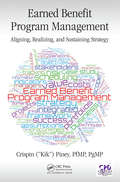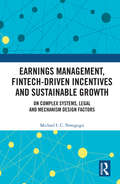- Table View
- List View
Earn More, Stress Less
by Fergus O'ConnellIf you heard there was a way to attract all the money you want, would you try it?It doesn't matter what's happened to you in the past or what your current situation is - you can live the life you want and never worry about money again. Earn More, Stress Less is your practical guide to living the law of attraction. It maps out a series of well-defined, realistic steps to help you get as much money as you want and put an end to financial worries.Successful people have been using these principles for hundreds of years. By following the powerful and eminently sensible steps outlined here, you can use the science of getting rich to realise your financial dreams too. You'll discover:A clear explanation of how the law of attraction worksA way to decide exactly how much money you wantSimple, clear actions to start attracting wealthWays to stop worrying about moneyEasy steps to develop a daily routine to maintain your cash flowExamples, exercises, templates and how-to'sCase studies of people who have used the Earn More, Stress Less method to great successAre you ready to give it a try?"An astonishing guide to attract all the money you want and transform your life. Highly recommended." Dr. Joe Vitale contributor to The Secret and bestselling author of The Key and The Attractor Factor.
Earn What You Deserve
by Jerrold MundisA revolutionary guide to earning power and personal budgeting shows readers how to spend wisely, streamline their finances, and develop a budget that puts their money where they want it to go.From the Paperback edition.
Earn What You're Really Worth
by Brian TracyOne of the most important assets you have is your earning ability: your ability to do something that other people will pay you for. This asset can be valuable and increase each year, or it can be stagnant and flat. Your greatest financial responsibility is to organize your time and your work so that you earn the very most possible throughout your lifetime. Earn What You’reReallyWorthwill show you how. This book will be the bible of career advancement for your indefinite future. These tested, proven strategies will save you years of hard work and thousands of dollars of lost income. You will learn how to organize your life to ensure that you are earning the very maximum at every stage of your career. Earn What You’reReallyWorthis for every person who works in any competitive industry, including staff members or executives who want to earn more money, people in job transition, students entering the workplace, and every unemployed person who wants to get back into the workforce.
Earn What You're Really Worth
by Brian TracyOne of the most important assets you have is your earning ability: your ability to do something that other people will pay you for. This asset can be valuable and increase each year, or it can be stagnant and flat. Your greatest financial responsibility is to organize your time and your work so that you earn the very most possible throughout your lifetime. Earn What You're Really Worth will show you how. This book will be the bible of career advancement for your indefinite future. These tested, proven strategies will save you years of hard work and thousands of dollars of lost income. You will learn how to organize your life to ensure that you are earning the very maximum at every stage of your career. Earn What You're Really Worth is for every person who works in any competitive industry, including staff members or executives who want to earn more money, people in job transition, students entering the workplace, and every unemployed person who wants to get back into the workforce.
Earn What You're Really Worth: Maximize Your Income at Any Time in Any Market
by Brian TracyWhether you&’re searching for your first job or looking for a career change, this essential guidebook is here to set you up for success and land you the job and income you deserve. One of the most important assets you have is your earning ability: your ability to do something that other people will pay you for. This asset can be valuable and increase each year, or it can be stagnant and flat. Your greatest financial responsibility is to organize your time and your work so that you earn the very most possible throughout your lifetime. Earn What You're Really Worth will show you how. This book will be the bible of career advancement for your indefinite future. These tested, proven strategies will save you years of hard work and thousands of dollars of lost income. You will learn how to organize your life to ensure that you are earning the very maximum at every stage of your career. Earn What You're Really Worth is for every person who works in any competitive industry, including staff members or executives who want to earn more money, people in job transition, students entering the workplace, and every unemployed person who wants to get back into the workforce.
Earn Your MBA on the Toilet: Unleash Unlimited Power and Wealth from Your Bathroom
by Kasper HauserMove over Harvard, Stanford, and Wharton--there's a new top-ranking MBA program in town! With the Kasper Hauser Continuing Education Academy, all it takes is a few minutes and a roll of bathroom tissue to earn a fully-accredited executive business degree. For the hundreds of millions of Americans who are looking for better, more successful, and more fulfilling lives--but don't have the time and money to invest in a full-on graduate degree--comes this revolutionary new system that turns crap into gold! With Earn Your MBA on the Toilet, the Kasper Hauser Continuing Education Academy offers readers a complete business education, on subjects ranging from Accounting to Widgets to Business Ethics to Ethical Pickles. Why spend $100,000 and two years on an MBA when you can simply read this book? Written for the busy professional, the unemployed CEO, or the motivated alcoholic, this incredible course condenses thousands of hours of business wisdom into a 72-minute crash course, chunked into 3-minute "jam sessions." After a mere 8 trips to the toilet, readers will be able to hold their own with a finance professor at a cocktail party; after 15, they will be qualified to work as a management consultant for a Bass Pro shop; and by the end they will have a certificate of completion that is definitely, literally an MBA degree on par with the big guys, basically.
Earn a Million Plus: The Little Known High-Income Occupation of Media Buyer
by Bruce CranAn engaging and brilliant masterclass on becoming a highly paid e-commerce Media Buyer.
Earn the Right to Win: How Success in Any Field Starts with Superior Preparation
by David Fisher Tom Coughlin Michael StrahanA top NFL coach offers leadership advice that applies from the field to the office. Tom Coughlin led the New York Giants to two Super Bowl victories with his unique system of relentless preparation and resilience. He teaches his players that you can never guarantee a win, but you can always earn the right to win--with focus, hard work, and anticipation of obstacles. Now Coughlin shows how his teachings apply beyond the gridiron, illustrating his points with previously untold stories about players like Eli Manning, Doug Flutie, and Michael Strahan. His wisdom can help leaders in any field rev up their own organizations. ing flexibility into your game plan Paying close attention to the details, because every piece of information is an advantage over the competition Establishing trust and open communication with your team Coughlin illustrates his lessons with previously untold stories about prominent players like Eli Manning, Doug Flutie, and Michael Strahan. Earn the Right to Win can help you master a winning combination: preparation, smart decision making, and toughness in the face of adversity. It's a powerful guide for leaders in any kind of organization.
Earned Benefit Program Management: Aligning, Realizing, and Sustaining Strategy (Best Practices in Portfolio, Program, and Project Management)
by Crispin PineyNo one can disagree that benefits are good things. Whether you are responsible for projects, programs, or portfolios, you are increasingly expected to think—and act—in an appropriate benefits-driven way. However: Do you understand that what may be appropriate for a project may be inapplicable for a program? Can you avoid the trap of wishful thinking based on overinflated expectations and underestimated costs? Can you manage your program or portfolio from inception to final delivery in a consistent, benefits-focused way based on a single, coherent model? This book describes how Earned Benefit Program Management techniques provide an innovative, all-inclusive model and set of tools developed specifically to answer these questions. This model consolidates the key concepts of project, program, and portfolio management and ensures that all program and portfolio management steps are carried out based on a single, signed-off model in a consistent, verifiable manner within a consolidated life cycle. This approach guarantees alignment with strategic goals and constraints through every stage of a program. Case studies highlight the key features of the approach and provide important lessons and insights for managing programs. Although the ideas and concepts for each topic are fully consistent with existing standards and other published material, they are based on new thinking and go beyond current practice. They provide a set of original and powerful techniques that are applicable to both programs and portfolios in a wide range of business environments.
Earnestly Contending: Religious Freedom and Pluralism in Antebellum America
by Dickson D. Bruce Jr.In Earnestly Contending, Dickson Bruce examines the ways in which religious denominations and movements in antebellum America coped with the ideals of freedom and pluralism that exerted such a strong influence on the larger, national culture. Despite their enormous normative power, these still-evolving ideals—themselves partly religious in origin—ran up against deeply entrenched concerns about the integrity of religious faith and commitment and the role of religion in society. The resulting tensions between these ideals and desires for religious consensus and coherence would remain unresolved throughout the period.Focusing on that era’s interdenominational competition, Bruce explores the possibilities for and barriers to realizing ideals of freedom and pluralism in antebellum America. He examines the nature of religion from the perspectives of anthropology and cognitive sciences, as well as history, and uses this interdisciplinary approach to organize and understand specific tendencies in the antebellum period while revealing properties inherent in religion as a social and cultural phenomenon. He goes on to show how issues from that era have continued to play a role in American religious thinking, and how they might shed light on the controversies of our own time.
Earning It: Hard-Won Lessons from Trailblazing Women at the Top of the Business World
by Joann S. LublinMore than fifty trailblazing executive women who broke the corporate glass ceiling offer inspiring and surprising insights and lessons in this essential, in-the-trenches career guide from Joann S. Lublin, a Pulitzer-Prize winning journalist and management news editor for The Wall Street Journal.Among the first female reporters at The Wall Street Journal, Joann S. Lublin faced a number of uphill battles in her career. She became deputy bureau chief of the Journal’s important London bureau, its first run by women. Now, she and dozens of other women who successfully navigated the corporate battlefield share their valuable leadership lessons.Lublin combines her fascinating story with insightful tales from more than fifty women who reached the highest rungs of the corporate ladder—most of whom became chief executives of public companies —in industries as diverse as retailing, manufacturing, finance, high technology, publishing, advertising, automobiles, and pharmaceuticals. Leaders like Carly Fiorina, former CEO of Hewlett-Packard, as well as Mary Barra, CEO of General Motors, and Brenda Barnes, former CEO of Sara Lee, were the first women to run their huge employers. Earning It reveals obstacles such women faced as they fought to make their mark, choices they made, and battles they won—and lost.Lublin chronicles the major milestones and dilemmas of the work world unique to women, providing candid advice and practical inspiration for women of all ages and at every stage of their careers. The extraordinary women we meet in the pages of Earning It and the hard-won lessons they share provide a compelling career compass that will help all women reach their highest potential without losing a meaningful personal life.
Earning Money: Jobs
by James FischerThere are many systems that countries can use to run their economies, including capitalism, communism, and socialism. The United States is a capitalist country. Learn all this and more in All About Money: The History, Culture, and Meaning of Modern Finance.
Earning Power: Breaking Barriers and Building Wealth for Women
by Roxanne CalderDiscover how to boost your earnings so you can close the million-dollar pay gap Did you know that over a lifetime, the gender pay gap can cost women over one million dollars? In Earning Power, you'll find the knowledge, strategies and confidence you need to make work and life decisions that maximise your personal earning potential. Most of us assume the pay gap is not an issue in our industry or workplace—or we think it only matters when it comes to negotiating salary. But from your super contributions to maternity leave, what you do with your pay can have a compounding and lifelong effect on your finances. Everyday workplace decisions like simply putting up your hand in a meeting can have a crucial impact on your long-term financial goals. Earning Power reveals the mindset and the tools that will help you bridge the gap and take control of your financial future. It features interviews with real women on the career challenges and choices they've faced, with stories and advice from Nagi Maehashi of RecipeTin Eats, kikki.K founder Kristina Karlsson, journalist and presenter Leila McKinnon, pioneering burns surgeon Professor Fiona Woods, and more. Uncover the data and insights that show where and how women fall behind in their earnings—and learn to identify opportunities for boosting your worth. Discover the million-dollar formula that will guide your decision-making. Read powerful, inspirational stories from women who have struggled with stereotypes, bias, setbacks, anxiety and imposter syndrome. Get crucial tips and immediate, actionable advice for the critical crossroads in your career. Foster your growth and purpose—and cultivate the confidence and resilience you need for success. Align your earnings goals with life's milestones and its curveballs. It's time to find financial equity and close the gap. With Earning Power, you'll discover the simple, small steps and key decisions that can make a million dollars' worth of difference. "Roxanne is a true leader in helping women be the very best they can be. This is an essential guide to the everyday actions critical for boosting your worth professionally and financially."—Helen McCabe, Founder, Future Women
Earnings Accruals and Real Activities Management around Initial Public Offerings
by Peter IsingThe beginning of the new millennium was characterized by company scandals in accounting around the world. A transparent and fair presentation of financial statements is beneficial for capital market participants. Especially around initial public offerings different incentives of these players exist to influence financial statements in diverse aspects. Therefore, studies of earnings management try to identify abnormal behavior. Peter Ising covers additional aspects to shed light on substantial drivers of discretionary reporting behavior around going public. Factors like influence on real activities, industry affiliation, and specific years in the IPO process add further insight to this theoretical and practical topic. The dependence on these factors is high and confirms that company specifics are important for interpretation of financial results.
Earnings Management and Corporate Finance: The Importance of Transparent Financial Reporting (Routledge Studies in Accounting)
by Joanna Lizińska Marzena Remlein Leszek CzapiewskiIn today's dynamic landscape of accounting, corporate finance, and business management, earnings management has assumed paramount importance. Transparent and reliable accounting information is crucial for accurate corporate performance forecasting and financial decision-making. This book uniquely discusses practical earnings management methods within the accounting and taxation realms. It is supported by extensive international evidence linking informativeness of financial reports to companies’ financial decisions. Delving into the earnings management process, this book provides profound insights into how profits can be influenced through accounting choices and real business transactions. Real-life case studies will undoubtedly facilitate the understanding of accounting and taxation methods. Additionally, it unravels key elements of corporate finance puzzles related to the transparency of financial reports, including the macroeconomic environment, profit thresholds, cash management, audit quality, financing decisions, and financial health. With broad empirical evidence from various European countries, it multidimensionally explores the important link between the quality of information in financial statements and trade-offs behind financial decisions.The book serves as a valuable reference for international researchers in corporate finance, accounting, and corporate governance. It is also a powerful tool for business practitioners, including owners, lenders, auditors, regulatory and professional bodies, business partners, or other market participants. For those seeking the latest insights on earnings management, those producing or assessing accounting information, and those using financial reports in their research or business practice, this book is a must-read.
Earnings Management, Fintech-Driven Incentives and Sustainable Growth: On Complex-Systems, Legal and Mechanism Design Factors
by Michael I. NwoguguTraditional research about Financial Stability and Sustainable Growth typically omits Earnings Management (as a broad class of misconduct), Complex Systems Theory, Mechanism Design Theory, Public Health, psychology issues, and the externalities and psychological effects of Fintech. Inequality, Environmental Pollution, Earnings Management opportunities, the varieties of complex Financial Instruments, Fintech, Regulatory Fragmentation, Regulatory Capture and real-financial sector-linkages are growing around the world, and these factors can have symbiotic relationships. Within Complex System theory framework, this book analyzes these foregoing issues, and introduces new behaviour theories, Enforcement Dichotomies, and critiques of models, regulations and theories in several dimensions. The issues analyzed can affect markets, and evolutions of systems, decision-making, "nternal Markets and risk-perception within government regulators, operating companies and investment entities, and thus they have Public Policy implications. The legal analysis uses applicable US case-law and statutes (which have been copied by many countries, and are similar to those of many common-law countries). Using Qualitative Reasoning, Capital Dynamics Theory (a new approach introduced in this book), Critical Theory and elements of Mechanism Design Theory, the book aims to enhance cross-disciplinary analysis of the above-mentioned issues; and to help researchers build better systems/Artificial-Intelligence/mathematical models in Financial Stability, Portfolio Management, Policy-Analysis, Asset Pricing, Contract Theory, Enforcement Theory and Fraud Detection. The primary audience for this book consists of university Professors, PHD students and PHD degree-holders (in industries, government agencies, financial services companies and research institutes). The book can be used as a primary or supplementary textbook for graduate courses in Regulation; Capital Markets; Law & Economics, International Political Economy and or Mechanism Design (Applied Math, Operations Research, Computer Science or Finance).
Earnings Quality: Definitions, Measures, and Financial Reporting
by Elisa MenicucciThis book provides an overview of earnings quality (EQ) in the context of financial reporting and offers suggestions for defining and measuring it. Although EQ has received increasing attention from investors, creditors, regulators, and researchers in different areas, there are various definitions of it and different approaches for its measurement. The book describes the relationship between EQ and earnings management (EM) since they can be considered related challenges, especially in the context of international financial reporting standards (IAS/IFRSs). EM occurs when managers make discretionary accounting choices that are regarded as either an efficient communication of private information to improve the informativeness of a firm’s current and future performance, or a distorting disclosure to mislead the firm’s true performance. The intentional manipulation of earnings by managers, within the limits allowed by the accounting standards, may alter the usefulness of financial reporting and lead to lower quality of earnings. The use of fair value in financial reporting has created a current debate about the impact it might have on EQ. At times, the high subjectivity in estimating fair value can allow opportunities for the exercise of management judgments and intentional bias, which can reduce the quality of financial reporting. Management discretion can result in high EM and hence in a reduction of EQ. Particularly during difficult financial periods, managers engage in EM to mask the negative effects of the turmoil, and in such circumstances accruals and earnings smoothing are attempts to reduce abnormal variations of earnings in such circumstances. This book is a valuable resource for those interested in wider perspectives on EQ and it adds to the research studies on this topic in the context of financial reporting.
Earth Building: Methods and Materials, Repair and Conservation
by Laurence KeefeBuildings with load-bearing earth walls were once widespread throughout Britain and many thousands still survive, including some dating from the fourteenth and fifteenth centuries. Earth is the ultimate form of ‘green’ building construction, creating no environmental pollutions and consuming virtually no energy. Subsoil can be dug from or near the site to construct buildings that will meet modern needs and conform to the latest building regulations. This book describes all aspects of earth building, explaining how earth performs as a building material and providing guidance on how best to repair and conserve existing earth buildings.
Earth Capitalism: Creating a New Civilization Through a Responsible Market Economy
by Patrick PetitToday a deepening global recession is causing economic hardships for all kinds of businesses. Earth Capitalism attributes the crisis to inappropriate macroeconomic policies and excessive expansion of financial institutions in blind pursuit of profit, lack of self-discipline among financial institutions, and the failure of supervision and regulation to keep up with financial innovations. Collectively, these are some of the main causes of the current global economic malaise.Petit argues that human greed and insatiability are the true source of disparities around the world. Greed is the reason why we are depleting the Earth's natural resources and destroying its ecosystems. He argues that instead, a good life should be based on balanced give-and-take. When we take something from society or the Earth, we have to maintain a balance by giving something equivalent back. Happiness is founded on gratitude for what one has, and one should engage in an overall appraisal of life, not what one lacks. He believes the same principle should be applied to management of the Earth's natural resources and goods.The current global crisis impels us to create a responsible capitalism, one that benefits all living beings on this planet. It reminds us to live a simpler life based on true well-being and life-satisfaction, but simple living is not about living in poverty. As its subtitle suggests, Earth Capitalism's contributors present leading edge economic concepts, business models, and best practices that show the path toward creation of responsible capitalism a viable scenario emerging from the current global economic and financial crisis.
Earth Democracy: Justice, Sustainability, and Peace
by Vandana ShivaBoldly confronting the neoconservative Project for the New American Century, world-renowned physicist and activist Vandana Shiva responds withEarth Democracy, or, as she prophetically names it, "The People's Project for a New Planetary Millennium. " A leading voice in the struggle for global justice and sustainability, here Shiva describes what earth democracy could look like, outlining the bedrock principles for building living economies, living cultures and living democracies. Starting from the initial enclosure of the commons--the privatization of six million acres of public land in eighteenth-century Britain--Shiva goes on to reveal how the commons continue to shrink as more and more natural resources are patented and fenced. Accompanying this displacement from formerly accessible territory, she argues, is a growing attitude of disposability that erodes our natural resources, ecological sustainability and cultural diversity. Worse, human beings are by no means safe from this assignment of disposability. Through the forces of neoliberal globalization, economic and social exclusion work in deadly synergy to perpetrate violence on vulnerable groups, extinguishing the lives of millions. Yet these brutal extinctions are not the only trend shaping human history. Forthright and energetic, Vandana Shiva updates readers on the movements, issues and struggles she helped bring to international attention--the genetic engineering of food, the theft of culture and the privatization of natural resources--and deftly analyzes the successes and new challenges the global resistance now faces. From struggles on the streets of Seattle and Cancun and in homes and farms across the world has grown a set of principles based on inclusion, nonviolence, reclaiming the commons and freely sharing the earth's resources. These ideals, which Shiva calls "earth democracy," will serve as unifying points in our current movements, an urgent call to peace and the basis for a just and sustainable future.
Earth Follies: Feminism, Politics and the Environment (Routledge Library Editions: Environmental Policy #11)
by Joni SeagerFirst published in 1993. The question of ‘agency’ is essential to our understanding of environmental problems - who is responsible, and why? Threats such as ozone depletion, global warming and overconsumption are all precipitated by the powerful institutions which shape modern life – institutions which are overwhelmingly controlled by men and dominated by masculine presumptions. Joni Seager argues that the gender bias inherent in western culture is inextricably linked to our environmental crisis. She analyses the traditional institutes of power – governments, the military and transnational corporations - and also takes a critical look at the equally patriarchal environmental establishment, comparing the work of the official environmental movement, grounded in masculine thought, with the smaller-scale, direct actions taken by women driven to protect their homes and communities. Earth Follies represents an incisive and utterly convincing feminist critique of our environmental crises, and offers radical and productive priorities for the environmental agenda.
Earth Matters: Indigenous Peoples, the Extractive Industries and Corporate Social Responsibility
by Ciaran O'Faircheallaigh Saleem AliIndigenous peoples have historically gained little from large-scale resource development on their traditional lands, and have suffered from its negative impacts on their cultures, economies and societies. During recent decades indigenous groups and their allies have fought hard to change this situation: in some cases by opposing development entirely; in many others by seeking a fundamental change in the distribution of benefits and costs from resource exploitation. In doing so they have utilised a range of approaches, including efforts to win greater recognition of indigenous rights in international fora; pressure for passage of national and state or provincial legislation recognising indigenous land rights and protecting indigenous culture; litigation in national and international courts; and direct political action aimed at governments and developers, often in alliance with non-governmental organisations (NGOs). At the same time, and partly in response to these initiatives, many of the corporations that undertake large-scale resource exploitation have sought to address concerns regarding the impact of their activities on indigenous peoples by adopting what are generally referred to as "corporate social responsibility" (CSR) policies. This book focuses on such corporate initiatives. It does not treat them in isolation, recognising that their adoption and impact is contextual, and is related both to the wider social and political framework in which they occur and to the activities and initiatives of indigenous peoples. It does not treat them uncritically, recognising that they may in some cases consist of little more than exercises in public relations. However, neither does it approach them cynically, recognising the possibility that, even if CSR policies and activities reflect hard-headed business decisions, and indeed perhaps particularly if they do so, they can generate significant benefits for indigenous peoples if appropriate accountability mechanisms are in place. In undertaking an in-depth analysis of CSR and indigenous peoples in the extractive industries, the book seeks to answer the following questions. What is the nature and extent of CSR initiatives in the extractive industries and how should they be understood? What motivates companies to pursue CSR policies and activities? How do specific political, social and legal contexts shape corporate behaviour? What is the relationship between indigenous political action and CSR? How and to what extent can corporations be held accountable for their policies and actions? Can CSR help bring about a fundamental change in the distribution of benefits and costs from large-scale resource exploitation and, if so, under what conditions can this occur? Earth Matters gathers key experts from around the world who discuss corporate initiatives in Alaska, Ecuador, Australia, Canada, Peru, Papua New Guinea, Indonesia and Russia. The book explores the great diversity that characterises initiatives and policies under the name of "corporate social responsibility", the highly contingent and contextual nature of corporate responses to indigenous demands, and the complex and evolving nature of indigenous–corporate relations. It also reveals much about the conditions under which CSR can contribute to a redistribution of benefits and costs from large-scale resource development. Earth Matters will be essential reading for those working in and studying the extractive industry worldwide, as well as those readers looking for a state-of-the-art description of how CSR is functioning in perhaps its most difficult setting.
Earth Observation Science and Applications for Risk Reduction and Enhanced Resilience in Hindu Kush Himalaya Region: A Decade of Experience from SERVIR
by Rajesh Bahadur Thapa Birendra Bajracharya Mir A. MatinThis open access book is a consolidation of lessons learnt and experiences gathered from our efforts to utilise Earth observation (EO) science and applications to address environmental challenges in the Hindu Kush Himalayan region. It includes a complete package of knowledge on service life cycles including multi-disciplinary topics and practically tested applications for the HKH. It comprises 19 chapters drawing from a decade’s worth of experience gleaned over the course of our implementation of SERVIR-HKH – a joint initiative of NASA, USAID, and ICIMOD – to build capacity on using EO and geospatial technology for effective decision making in the region. The book highlights SERVIR’s approaches to the design and delivery of information services – in agriculture and food security; land cover and land use change, and ecosystems; water resources and hydro-climatic disasters; and weather and climate services. It also touches upon multidisciplinary topics such as service planning; gender integration; user engagement; capacity building; communication; and monitoring, evaluation, and learning. We hope that this book will be a good reference document for professionals and practitioners working in remote sensing, geographic information systems, regional and spatial sciences, climate change, ecosystems, and environmental analysis. Furthermore, we are hopeful that policymakers, academics, and other informed audiences working in sustainable development and evaluation – beyond the wider SERVIR network and well as within it – will greatly benefit from what we share here on our applications, case studies, and documentation across cross-cutting topics.
Earth Observation for Water Resources Management: Current Use and Future Opportunities for the Water Sector
by Luis Garcãa Pakulski Marcus Wijnen Diego RodrãguezWater systems are building blocks for poverty alleviation, shared growth, sustainable development, and green growth strategies. They require data from in-situ observation networks. Budgetary and other constraints have taken a toll on their operation and there are many regions in the world where the data are scarce or unreliable. Increasingly, remote sensing satellite-based earth observation is becoming an alternative. This book briefly describes some key global water challenges, perspectives for remote sensing approaches, and their importance for water resources-related activities. It describes eight key types of water resources management variables, a list of sensors that can produce such information, and a description of existing data products with examples. Earth Observation for Water Resources Management provides a series of practical guidelines that can be used by project leaders to decide whether remote sensing may be useful for the problem at hand and suitable data sources to consider if so. The book concludes with a review of the literature on reliability statistics of remote-sensed estimations.
Earth Summit 2002: A New Deal
by Felix Dodds'As we start the preparations for the Earth Summit in 2002, 10 years from Rio and 30 years from Stockholm, we need to set targets and dates that are realistic to deliver the change that is needed. There will also need to be a debate on the international machinery to achieve what we want, and 2002 will be significant in setting out the direction. This book has drawn in some of the key people who are working to make 2002 a significant event' FROM THE FOREWORD BY KLAUS TOPFER, EXECUTIVE DIRECTOR, UNITED NATIONS ENVIRONMENT PROGRAMME AND CENTRE FOR HUMAN SETTLEMENTS At the Earth Summit in Rio in 1992, world leaders adopted a comprehensive programme of action for implementing sustainable development worldwide. As preparations for Earth Summit 2002 proceed, leading players from around the world present a frank assessment of progress to date. They set goals and describe mechanisms that will enable the international community to complete the tasks set in Rio and prepare for new challenges and opportunities. This book will be a catalyst for the public and political momentum required to push forward the global sustainable development agenda.























